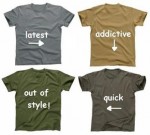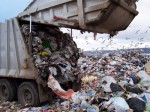What future fashion?
 The world is changing very quickly and resources that were abundant before
The world is changing very quickly and resources that were abundant before
are not anymore. There are 1.3 billion people in China, over 1 billion in
India and nearly 300million in Brazil. If all those countries are to have
the same standard of life as Europeans and Americans, we will need three
planets just like earth to serve that need. We are getting to the point
where business as usual right now means no business in the future.
A couple of interesting facts:
1. The global fashion and luxury sector was worth around $1.334.1 billion in
2008
2. The UK fashion industry was worth some £37billion to the UK economy in
employing nearly a million.
3. Between 2002 and 2006, there was a 33% increase in the amount of clothing
bought.
4. The average person goes through about 35kg of textiles a year, most of
which is clothing and is thrown away within a year of purchase. In 2005 this
resulted in 1.2 million tonnes of clothing going to landfill.
So whats the problem? Well, clothing is getting cheaper, but climate
change, water shortages and oil prices all point the other way. What is
happening that makes clothing so cheap? Well, when value retailers sell
their clothing cheaply they usually say its because of economies of scale;
what they are less quick to say is that the fast fashion trend has also led
to lower standards both in the quality of materials used and also in the
quality of the finish.
 Many have heard of the term Fast Fashion yet many may not fully understand
Many have heard of the term Fast Fashion yet many may not fully understand
what this means and the knock on effects this type of fashion has.
A report by the UK government states that the culture of “fast fashion”
encourages consumers to dispose of clothes which have only been worn a few
times in favour of new, cheap garments which themselves will also go out of
fashion and be discarded within a matter of months. (Select Committee on
Science and Technology, 2008)
Fast Fashion is a relatively recent development however, as environmental
and ethical issues play more of a role in peoples decision making, this
part of the fashion industry already finds itself at a crossroads not just
because of its social and environmental impacts but also due to its link to
a broken economic system which values short term profits over long term
planning and does not accept responsibility for solving social and
environmental problems it causes.
The fashion industry relies on many factors. Natural resources such as soil
and water are just as important as the people who process materials and make
the end products. Many items are today made from materials such as,
polyester and nylon which are all oil based; as are womens tights, zips,
flip flops, fake fur and sneakers. Environmental conflicts in the fashion
industry have always existed. Since the industrial revolution
discharges/effluent from factories has flowed into rivers and lakes. At
first this did not seem to matter as it was seen as the price to pay for
progress. In more recent years the industry had managed to keep the
realities of an extremely polluting industry hidden away from the public by
relocating production to developing countries. In so doing, companies were
able to outsource production and concentrate on the advertising and
marketing of their products. Companies have been very reluctant to accept
the role that they play in creating difficult working situations and
environmental damage.
 This part of the industry works on volume the more we buy, the more they
This part of the industry works on volume the more we buy, the more they
produce the more companies profit. The only aim of is to squeeze margins.
Yet with no monitoring and no real programs in place to collect waste, the
majority of this clothing ends up in the trash only after a couple of wears.
From a psychological point of view, if a t-shirt is only worth 2 pounds
($3.25 USD) there is no incentive to keep that t-shirt as we tend to give
more value to items that we consider expensive. But when you start to
consider all the work that has been done to make these items, it just does
not add up. For a cotton t-shirt, we need cotton transportation, processing,
dyeing, marketing and advertising costs, paying staff at the point of sale
as well as rent and utilities. All that from a 2 pound($3.25 USD) t-shirt? I
think not. Something or someone is getting a very raw deal namely the
producers and the planet.
The more we make, the more we cause stress to the planet and the more
pressure clothing companies put on their factories and therefore on the
people who make clothing. The stories we hear about abuses in factories or
children working in cotton fields are a direct consequence of our thirst for
cheap fashionable clothing. Moving away from this way of business will allow
us to recalibrate the way that business is done and encourage a new norm
one where people and planet are taken accounted for in the search of profit.
Firms are slowly coming to terms with factors that have begun to place
limits on their growth. These are systemic issues which will the industry
will have to contend and these tie in closely to the nature of the firm and
its relationship with the ecosystem that supports it. The effect of
globalisation when combined with modern technology is to effectively erase
boarders. At the start of the outsourcing process, customers were
uninterested in where goods came from. For them, the only thing that
mattered was that items that they could not afford previously were now
accessible. As environmental discourses started to emerge and the true
impact of global industries started to come to light, stories of
maltreatment and environmental degradation came to the surface and the
supply chain factors are no longer a distant murmur.
Christian Smith – @MrMetaphysical
Women
A wide selection of stylish fashion clothing for all occasions including: dresses, tops, knitwear, skirts, eveningwear, coats, suits, jackets and more. Styles to suit a variety of tastes from classic to vintage and more in between: recycled and upcycled. This is sustainable ethical fashion at it's best.
Women's Ethical ClothingMen
If you're looking for something eco or ethical to wear for dress down friday, a casual weekend or holiday, you'll find it here. Tops, t-shirts, jeans, trousers from mainly fairtrade and organic cotton.
Men's Ethical FashionKids
Green fashion for kids is fun and made mainly from natural fibres including organic cotton and Fairtrade cotton. From baby to early teens, there's something to make all kids happy. Bright colours, animals, fun shapes that children can wear all year round.
Kids Green ClothingAccessories
A treasure trove of accessories from around the world can be found here. A vast selection of jewellery including necklaces, bracelets, rings and earrings to shoes, hats, bags, handbags and scarves. Whatever your style, these items will complete any outfit.
Eco-Friendly Accessories





Comments are closed.